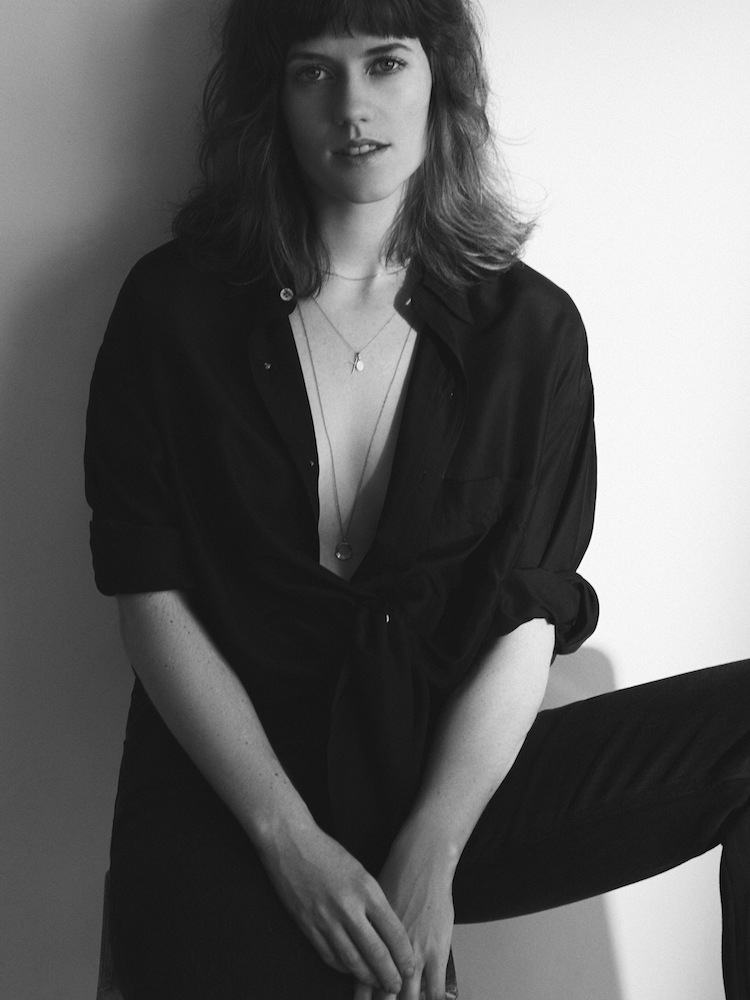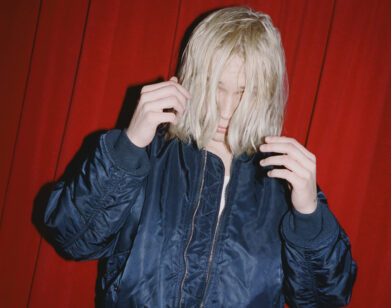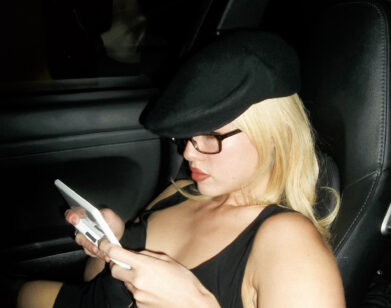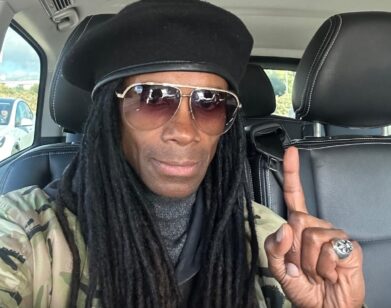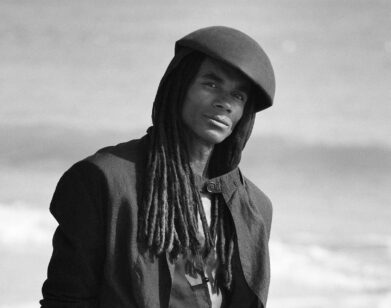Katie Von Schleicher
KATIE VON SCHLEICHER IN BROOKLYN, MAY 2017. PHOTOS: HANS NEUMANN. STYLING: ESTHER MATILLA. HAIR: TAKASHI YUSA FOR MAM-NYC USING L’OREAL. MAKEUP: CEDRIC JOLIVET USING MAC COSMETICS.
Katie Von Schleicher’s Shitty Hits, out July 28, is an album’s worth of songs, built layer by layer from cassette recordings, that range from melancholy ballads to punchy confessionals. A testament to experimentation and emotional transparency, it’s a rock record that’s tough to shake in the best way—a sonic puzzle that’ll whirl in your head and sit in your chest long after you listen.
Von Schleicher, 30, works at Ba Da Bing Records, the label behind Shitty Hits and her 2015 album Bleaksploitation—which was, characteristically, first recorded to tape and based on a “really warbly and fucked up and heavy” genre she and a friend jokingly invented back in college. With joy, she recalls receiving the initial shrink-wrapped cassette run of Bleaksploitation, a moment that solidified confidence in her lo-fi approach. “Finally, for the first time, I was like, ‘This is what I’ve been hearing in my head. This is what I’m trying to do,'” she says. “I’m not going to apologize for the terrible sound quality of me singing through pedals, through an amp, into an SM58 microphone, into a tape machine.”
Interview recently spoke to Von Schleicher, who’s based in Brooklyn, by phone. Topics of conversation include cassettes, depression, humor, and books (primarily blue ones).
HALEY WEISS: I’d like to hear a little bit about how long you’ve been working on Shitty Hits and what your mindset was going into writing this set of songs.
KATIE VON SCHLEICHER: Well, I was coming out of Bleaksploitation, which was my first foray into self-recording and tape. I was listening to a lot of Brian Eno, a lot of Paul McCartney post-Beatles, R. Stevie Moore—anyone who shut themselves in with a rudimentary machine. For the record, I’ve only recorded on tape before, so I’ve done four-track and I’ve done 16-track, and for this I wanted to expand and make something where I had tons of different tracks, something where you couldn’t place certain sounds. I wanted to write songs that were more concise and I’d say, for a lack of a better word, more rocking than I had made before. [laughs] I approached the songwriting from this place of emotional content, where I always approach songwriting. From an emotional side of things, I am writing about mental illness, anxiety, depression, a feeling of powerlessness, a feeling of loss of perspective, and then trying to take that and make a record that would be done in the ethic of full-on empowerment and intensity. It’s kind of a two-pronged effort to convey what I was feeling.
I started first by potentially working with a producer, and that was winter of 2016, and I felt uncomfortable with it, so I changed my mind and I shelved everything for a while. Then, in June of 2016, I again went to go to a studio, and everything was being properly recorded, and again I felt it wasn’t right. So I had two strikeouts and I was feeling a bit more lost than ever. I think every time you make an album, or every time I make an album, it feels like the only time I could possibly have this energy to make an album, because it’s so much back-and-forth, so many decisions, and eventually I ended up asking my friend and drummer Julian [Fader] to bring a tape machine to my parents’ house in Maryland. Julian and Adam [Brisbin], the guitarist, and I went there and we recorded eight tracks on each song to a cassette tape, just basics. Then I brought it back here to Brooklyn and recorded the remaining 20 to 30 tracks on each song here in my room.
WEISS: When you had that experience of shelving the record twice, how did you get past that feeling of striking out? Did you have to take a break?
VON SCHLEICHER: I think my creative life… I mean, the reason why I go to therapy every week is that I’m filled with questions and potential answers to how to be as a creative person when you have a tendency toward imposter syndrome, or if you are just a human being and you get down after you feel like you’ve failed in some capacity. It’s definitely a mix of when to take a break and when to throw yourself into it. Between each of those attempts I had moments where I felt like it wasn’t going to work out at all. In the end I’ve found empowerment by realizing that people—often, guys—offer to produce you, and in the end that’s the thing that really turns me on about making music. I love writing songs, but if I can help to also produce it and make what I hear in my head a reality, then I can get really excited about the process. Eliminating other factors and accepting that the weight of it rested on my shoulders was a motivator.
WEISS: A sense of humor obviously comes into play in the title of the album, Shitty Hits, which is hilarious. But I feel like it’s also at work with what you’re doing conceptually in some of the songs, like “Life’s A Lie,” which has a sort of jaunty melody but it’s a bit darker lyrically. How important is that sense of humor to you when you’re approaching more challenging subject matter?
VON SCHLEICHER: Well, not to make this too much about depression, [laughs] but people who have experienced depression, if I approach them and say, “Hey, I’m going through 72 hours of hell right now,” I find that someone who knows what you’re going through is the first person to change your feeling into a moment of laughter. It’s the best medicine for that feeling, so it’s really important to me in my personal life to joke. Musically, I’m still learning how to infuse humor in the right way or in a way that makes sense for me. Because in life I’m crass and constantly joking around, and on albums I have this voice that’s dripping with feeling and my songs are about real, serious things, I’m trying to bridge that gap. “Life’s A Lie” was something where I made this music and I went to write the lyrics afterward, and that was what was coming out; it’s this penchant to be self-pitying, a little bit mawkish, and then I realized, “Well, it’s funny, there’s a funny juxtaposition there.” It’s not how I look at the world, but it is how you can see the world sometimes. So I’m trying to pursue that, but it’s a process.
WEISS: There’s so much value in being able to write about depression and talk about it, but also to say, “Just because someone feels this depression doesn’t mean they can’t be funny or have a lighter side.”
VON SCHLEICHER: Right. I think that’s the thing about humor: it’s humanizing these things. That’s why people who experience it tend to be quite quick to make it relatable, simple, and normal to talk about, normal to share. That’s definitely the value of talking to other people who can relate at all, which I think many people can.
WEISS: I wanted to ask about some of your influences beyond music. I read an interview where you mentioned A Field Guide to Getting Lost [by Rebecca Solnit], which I happen to have just started reading. There was a particular quote you referenced, where she says, “There is a voluptuous pleasure in all that sadness.” What were you reading during this album that may have informed your outlook?
VON SCHLEICHER: I was reading A Field Guide to Getting Lost as I was finishing the album, and it really hit me hard over Christmas, over the holidays; I had been trying to get into it and I wasn’t as interested in it as first, which makes no sense to me now. I’m looking at my books and I’m thinking about this. A big one was Blue Highways by William Least Heat-Moon. I actually feel like the two books that really validated some things for me came after the album was finished, which would be Bluets by Maggie Nelson and A Field Guide to Getting Lost. But I’ve also been rereading two books by Ben Lerner: Leaving the Atocha Station and 10:04. I’m in this period of rereading things for the first time in my life. I’ve made it to 30 without reading a book twice, and then I sort of wanted the comfort of his wisdom. And I’ve been reading the My Struggle series by Karl Ove Knausgård; I’ve read it long past everyone else having given up on it. [laughs] I’m on book five now.
WEISS: Oh, wow. I don’t know anyone who’s made it to book five.
VON SCHLEICHER: It’s like I’m watching season six of the shittiest television show ever. [both laugh] It’s just a lot of young boners, that’s what he’s going through at this point. But yeah, I think Bluets, Blue Highways, this obsession with the color blue, which also is so often talked about in A Field Guide to Getting Lost. Trying to, I’m not sure how to phrase it in the best way possible, but getting closer to female writers. I was trying to focus on female writers, and I can’t get into the more difficult stuff or abstract stuff like Renata Adler. I was seeking out something that would have this really emotional content and phrasing and rhythm that would reach out.
WEISS: And Rebecca Solnit has that. I think I had a similar experience; I got to a point and realized the embarrassingly low amount of female authors I’d read, and she was one of the first I delved into.
VON SCHLEICHER: Right. I’m afraid to say that to a woman, and yet I believe as a woman I perpetuate that. It’s definitely something to take a look at, especially in terms of music journalism; there’s so much to be said about how women are covered. I keep thinking that I want to drive home the aspect of this being two different people working on this record: being this emotional person who writes songs and writes lyrics and is very open with feelings, and then there’s the other person who’s into pitch vibrato and weird effects and collects pedals and wants to produce strange things. I feel like it’s more frequent that the attention would be given to the first half.
WEISS: How do you think working at Ba Da Bing Records influences the way you approach your own music, as you’re listening to other artists frequently?
VON SCHLEICHER: Besides making me cynical about the sheer volume of people trying to make music, I think it’s made me feel, more than ever, free to experiment with sounds. There are so many people trying to make music, and yet there’s so little variance in what you see on a daily basis, at least in my experience receiving demos by email. It made me realize that all of these attempts to be careful were hindering making something that might actually be interesting. Reflecting on that, I think it’s helped me a lot to open up to weirder ideas, to my own ideas, unapologetically.
SHITTY HITS (BA DA BING RECORDS) IS OUT JULY 28, 2017. FOR MORE ON KATIE VON SCHLEICHER, VISIT HER WEBSITE.

